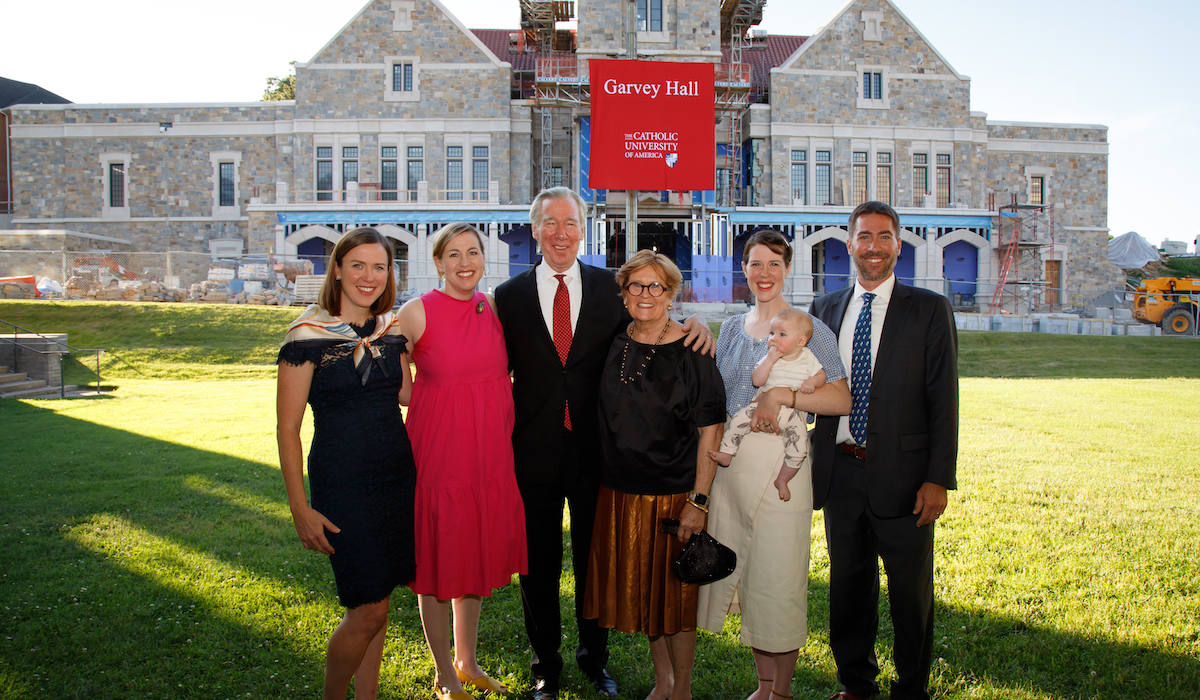

John and Jeanne Garvey with some of their family members.
A new dining commons, currently under construction on the The Catholic University of America campus and scheduled to open in fall 2022, will be named Garvey Hall in honor of University President John Garvey, who will step down on June 30 after 12 years of University leadership, and his wife, Jeanne Garvey.
The name was unveiled during an alumni and donor event on June 4 and was the recommendation of an anonymous donor who generously gave $8 million toward the construction of the new building. One-third of the building is being funded through private gifts.
Garvey Hall is the first campus-wide hub to be built since the Edward J. Pryzbyla University Center opened in 2003 (the dorm, Opus Hall, was constructed in 2009). Student dining space currently is located in the Pryzbyla Center, along with event and meeting rooms, student services and student organizations, but the building is not large enough to accommodate the current dining needs.
The nearly 35,000-square-foot Garvey Hall, located between the Pryzbyla Center and student dorms, will accommodate 490 diners in four dining areas plus the Center for Academic and Career Success (CACS) on the lower level. The space housing the CACS, which currently is in McMahon Hall, will be named in honor of Jeanne Garvey.
“Jeanne and I are honored to have this new dining commons named for us,” President Garvey said. “Even more, we are grateful that our students will soon have a beautiful place where they can eat their meals together, and an academic and career space proportioned to the size of their ambitions.”
The main 238-seat dining area will be called Byron Dining Room in honor of former University President Rev. William Byron, SJ. Fr. Byron served from 1982 to 1992. Van Smith was a University trustee at the time and he; his son, Victor Smith, J.D. 1996, chairman of the University’s Board of Trustees; and his daughter, Susan Smith Newell, J.D. 1993, M.A. 1994, a member of the Columbus School of Law’s Alumni Council and former member of its Board of Visitors, donated $1.2 million to the dining commons development and wished to honor Father Byron’s important role in the history of Catholic University.
The three other dining rooms will seat 30, 91 and 131 people, allowing for large and small group dining options.
The CACS, which provides guidance, resources and support for students and alumni to achieve academic and career goals, will be more visible and accessible in its new location. The center will gain private offices for advising and coaching, meeting rooms for virtual programming, and access to an open space for group live, virtual and hybrid programming. In 2021-22, nearly 10,000 students participated in appointments and programs through the CACS.
The area where it will be located is being named for Jeanne Garvey through the gift of Tim Scheve, B.A. 1980, donor and trustee emeritus, in recognition of the positive impact Mrs. Garvey has had on Catholic University students and of her own accomplishments. She holds a master’s degree in education from Harvard University and an M.B.A. from Stanford University and has held many positions in higher education institutions, including the University of Kentucky, Indiana University, and Boston College, where she was the director of career services for the M.B.A. program.
The 34,823 square-foot, two-story building is being constructed in the Collegiate Gothic style, which is a form of Gothic Revival architecture, popular in the late-19th and early-20th centuries for college and high school buildings, especially in the United States and Canada. The style has experienced a revival in recent years. The University’s nursing and sciences building now under construction also is designed in this style. The inspiration is drawn from English Tudor and Gothic buildings.
Two outdoor dining areas will overlook the University Lawn to the south and one, with a stone fireplace, the north. Byron Dining Room will include an interior stone fireplace with a 30-foot stone chimney. The south elevation has a prominent stone clock tower.
A connecting exterior stairwell through the middle of the building will connect residence halls to the north with the Pryzbyla Center and academic buildings to the south.